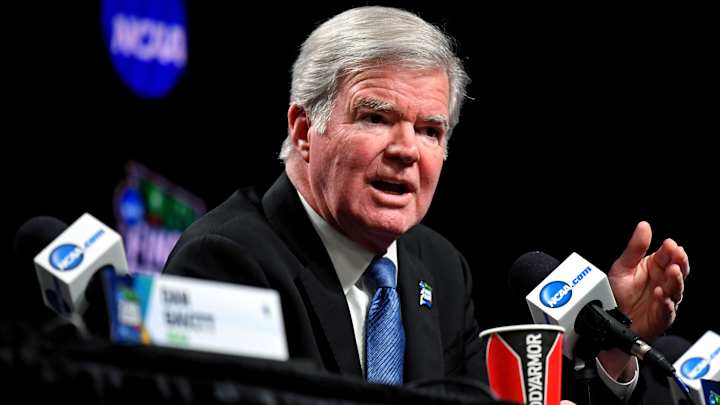#NotNCAAProperty Player Group Meets With Mark Emmert With Requests on NIL, Title IX and More

INDIANAPOLIS — In a meeting Thursday with NCAA president Mark Emmert, a college athlete group dubbed #NotNCAAProperty requested the organization adopt a temporary blanket waiver to grant players the right to earn compensation from their name, image and likeness, as allowed under state laws.
Emmert did not immediately agree to the request, and group leaders described the 45-minute meeting with Emmert as mostly unproductive, even saying that the NCAA leader denied the player group’s request to involve more athlete participants on the call, including women. The three leaders of the #NotNCAAProperty movement—Iowa guard Jordan Bohannon, Rutgers guard Geo Baker and Michigan forward Isaiah Livers—are men.
In an hour-long call with reporters, the group’s leaders expressed frustration with Emmert's not agreeing to grant them the right to involve women athletes in the meeting, but later clarified the issue as a misunderstanding after the NCAA sent Sports Illustrated a letter from Emmert to the group, on March 25, suggesting his openness to meet with all of the athletes, including women.
National College Players Association executive director Ramogi Huma told SI that athletes plan to schedule another call with Emmert to include women athletes.
All of this comes during a time in which the NCAA's leader has faced intense scrutiny over inequality between the men’s and women’s NCAA basketball tournaments. A discrepancy between the weight rooms at the tournaments made national news and had the governing body quickly enhancing the women’s weight room, at first nothing more than a single rack of dumbbells, a striking disparity to the sprawling and lavish men’s facility.
The player group’s three leaders, as well as several women athletes that included Iowa's Caitlin Clark and Michigan's Naz Hillmon, and two Democratic senators, met with reporters during an hour-long virtual news conference on Thursday, just minutes after the meeting with Emmert. They expressed disappointment and frustration in the governing body’s approach to name, image and likeness (NIL).
The NCAA was expected to pass NIL legislation in January before delaying the move, in part because of antitrust concerns aired by the Department of Justice and the ongoing legal battle over athlete compensation that was heard before the U.S. Supreme Court on Wednesday.
All of this takes place against the backdrop of a sweeping nationwide trend of states hurriedly passing their own differing NIL laws. Three more states—Mississippi, Arizona and Georgia—have since passed NIL laws this spring, joining six others that previously passed bills. Mississippi and Georgia’s governors must sign the bill in order for it to become law. Arizona’s state law would only take effect if the NCAA grants athletes the right to profit from NIL. Mississippi and Florida’s NIL laws would take effect July 1.
“Just a lot of talk,” says Baker, describing the conversation with Emmert. “The NCAA doesn’t want to be the first to take action [on NIL]. He kept saying Congress … Congress.”
The NCAA has spent the last 16 months petitioning Congress to create a unifying federal NIL bill to preempt varying state laws. There is newfound optimism on Capitol Hill. Senators Richard Blumenthal (D-Conn.) and Cory Booker (D-N.J.), who were both on Thursdays' news conference Zoom, are in compromise talks with two Republican senators, Roger Wicker and Jerry Moran, in an attempt to agree on one federal bill, as SI reported Tuesday.
Booker described the talks as “constructive dialogue.” Blumenthal says he and Booker plan to soon reintroduce their bill from last year’s Congress, the College Athletes Bill of Rights, a broad proposal that goes well beyond NIL.
During the Zoom call with reporters, Blumenthal eviscerated Emmert, at one point saying “the emperor has no clothes.”
“What I’ve heard about the conversation with Mark Emmert is a clear sign of lack of leadership,” the senator said. “He says he wants Congress to help him—well, we’re going to give him hell.”
Blumenthal described the NCAA’s appearance before the Supreme Court on Wednesday as an “unmitigated disaster” and suggested that the organization will lose the case.
"They are on the wrong side of history and if they needed any indication of it, they got it loud and clear (Wednesday),” he said.
Along with a blanket NIL waiver, the #NotNCAAProperty leaders requested two more items from Emmert. They want the NCAA to enforce Title IX, something currently enforced by government entities, and they want a voice on the NCAA’s primary legislative-making body, the NCAA Division I Council.
Emmert immediately agreed to at least look into a deeper enforcement of Title IX, says Baker. Emmert also agreed to more meetings with the group, though none are scheduled.

Ross Dellenger received his Bachelor of Arts in Communication with a concentration in Journalism December 2006. Dellenger, a native of Morgan City, La., currently resides in Washington D.C. He serves as a Senior Writer covering national college football for Sports Illustrated.